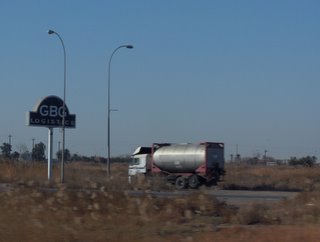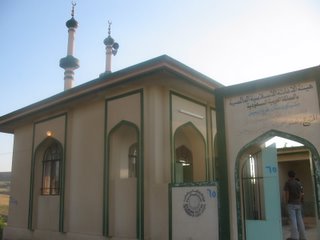Its too bad that
this blog will no longer be updated after the author's upcoming departure. Its also unfortunate that he's so down about the state of reconstruction in Iraq. I don't think everything is going swimmingly - far from it - but I'm not not about to call reconstruction efforts a total failure just yet.
I don't want to be an apologist for the situation. Jay Garner spoke at a conference just after he was replaced by Bremmer, and I nearly laughed at his comments. He was not a failure running Iraq, he explained, because none of the awful things that were supposed to occur ever came to pass. Contrary to certain predictions, there were few refugees after the war ended and there were no medical outbreaks of typhoid or malaria or any of the other diseases people said were sure to happen if the US invaded. So he was not a failure, because none of these things happened. Maybe he could take credit for disarming Saddam, too.
But I think it makes sense to take a step back and look at reconstruction projects for what they are. Projects, not magic bullets. They're not going to seal borders, stop foreign insurgents, or prevent car bombs. I don't think that the presence or absence of the insurgency should be the yardstick to measure the effectiveness of these projects. Would anyone blame French reconstruction efforts if the Ivory Coast has another coup and civil war? What if war breaks out between Eritrea and Ethiopia, does that indicate the failure of UN peacekeeping operations? No, I think in both situations its acknowledged that there are much greater forces at work that reconstruction and reconciliation projects cannot change. Such is the case for Iraq, too. These projects can only accomplish so much, and suddenly stopping the insurgency is not a legitimate expectation.
These projects should be expected to get the water flowing, the oil pumping, and the electricity running, and it is to the great discredit of reconstruction efforts that some of these basics do not significantly exceed prewar levels. Though, its worthwhile to keep in mind the level of coordination that's required for these projects. Its massive, and when travel is so restricted by security concerns, its difficult to plan anything too carefully. If US coordination domestically can't get the California power grid sorted out and keep the power running there, can it really be expected to have Baghdad functioning all the time, too?
It is also important to keep in mind that reconstruction and relief efforts are regularly criticized. I would be very interested to find one instance when public perception of the results of reconstruction were overwhelmingly positive. There is tremendous disapproval of Katrina and tsunami relief efforts. Both relief activities received a huge outpouring of aid, and both seem to have come up short in the eyes of their donors. The same is true for the Pakistan earthquake. In some ways, this criticism is understandable. The level of destruction is so vast that we expect a response that produces immense results. But most of the time that's just not possible.
I don't know the legitimate expectations for our work in Iraq, just as I don't have a clear definition for what constitutes "failure." But I do know we're helping many Iraqis daily, and working on many important projects that will yield results for years to come. Much of it is sustainable, too.



